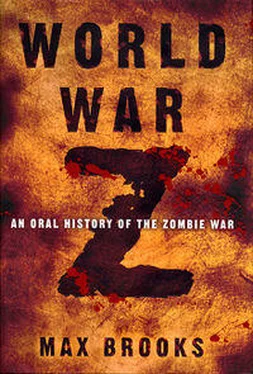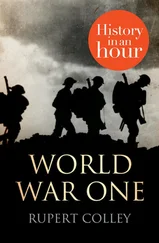What kind of misinformation were you combating?
Where do you want me to begin? Medical? Scientific? Military? Spiritual? Psychological? The psychological aspect I found the most maddening. People wanted so badly to anthropomorphize the walking blight. In war, in a conventional war that is, we spend so much time trying to dehumanize the enemy, to create an emotional distance. We would make up stories or derogatory titles… when I think about what my father used to call Muslims… and now in this war it seemed that everyone was trying desperately to find some shred of a connection to their enemy, to put a human face on something that was so unmistakably inhuman.
Can you give me some examples?
There were so many misconceptions: zombies were somehow intelligent; they could feel and adapt, use tools and even some human weapons; they carried memories of their former existence; or they could be communicated with and trained like some kind of pet. It was heartbreaking, having to debunk one misguided myth after another. The civilian survival guide helped, but was still severely limited.
Oh really?
Oh yes. You could see it was clearly written by an American, the references to SUVs and personal firearms. There was no taking into account the cultural differences… the various indigenous solutions people believed would save them from the undead.
Such as?
I’d rather not give too many details, not without tacitly condemning the entire people group from which this “solution” originated. As an Indian, I had to deal with many aspects of my own culture that had turned self-destructive. There was Varanasi, one of the oldest cities on Earth, near the place where Buddha supposedly preached his first sermon and where thousands of Hindu pilgrims came each year to die. In normal, prewar conditions, the road would be littered with corpses. Now these corpses were rising to attack. Varanasi was one of the hottest White Zones, a nexus of living death. This nexus covered almost the entire length of the Ganges. Its healing powers had been scientifically assessed decades before the war, something To do with the high oxygenation rate of the waters.” Tragic. Millions flocked to its shores, serving only to feed the flames. Even after the government’s withdrawal to the Himalayas, when over 90 percent of the country was officially overrun, the pilgrimages continued. Every country had a similar story. Every one of our international crew had at least one moment when they were forced to confront an example of suicidal ignorance. An American told us about how the religious sect known as “God’s Lambs” believed that the rapture had finally come and the quicker they were infected, the quicker they would go to heaven. Another woman-I won’t say what country she belonged to-tried her best to dispel the notion that sexual intercourse with a virgin could “cleanse” the “curse.” I don’t know how-many women, or little girls, were raped as a result of this “cleansing.” Everyone was furious with his own people. Everyone was ashamed. Our one Belgian crewmember compared it to the darkening skies. He used to call it “the evil of our collective soul.”
I guess I have no right to complain. My life was never in danger, my belly was always full. I might not have slept often but at least I could sleep without fear. Most importantly, I never had had to work in the Ural’s IR department.
IR?
Information Reception. The data we were broadcasting did not originate aboard the Ural. It came from all around the world, from experts and think tanks in various government safe zones. They would transmit their findings to our IR operators who, in turn, would pass it along to us. Much of this data was transmitted to us over conventional, open, civilian bands, and many of these bands were crammed with ordinary people’s cries for help. There were millions of wretched souls scattered throughout our planet, all screaming into their private radio sets as their children starved or their temporary fortress burned, or the living dead overran their defenses. Even if you didn’t understand the language, as many of the operators didn’t, there was no mistaking the human voice of anguish. They weren’t allowed to answer back, either; there wasn’t time. All transmissions had to be devoted to official business. I don’t want to know what that was like for the IR operators.
When the last broadcast came from Buenos Aires, when that famous Latin singer played that Spanish lullaby, it was too much for one of our operators. He wasn’t from Buenos Aires, he wasn’t even from South America.
He was just an eighteen-year-old Russian sailor who blew his brains out all over his instruments. He was the first, and since the end of the war, the rest of the IR operators have followed suit. Not one of them is alive today. The last was my Belgian friend. “You carry those voices with you,” he told me one morning. We were standing on the deck, looking into that brown haze, waiting for a sunrise we knew we’d never see. “Those cries will be with me the rest of my life, never resting, never fading, never ceasing their call to join them.”
The Demilitarized Zone: South Korea
[Hyungchol Choi, deputy director of the Korean Central Intelligence Agency, gestures to the diy, hilly, unremarkable landscape to our north. One might mistake it for Southern California, if not for the deserted pillboxes, fading banners, and rusting, barbed wire fence that runs to either horizon.]
What happened? No one knows. No country was better prepared to repel the infestation than North Korea. Rivers to the north, oceans to the east and west, and to the south [he gestures to the Demilitarized Zone], the most heavily fortified border on Earth. You can see how mountainous the terrain is, how easily defensible, but what you can’t see is that those mountains are honeycombed with a titanic military-industrial infrastructure. The North Korean government learned some very hard lessons from your bombing campaign of the 1950s and had been laboring ever since to create a subterranean system that would allow their people to wage another war from a secure location.
Their population was heavily militarized, marshaled to a degree of readiness that made Israel look like Iceland. Over a million men and women were actively under arms with a further five in reserve. That is over a quarter of the entire population, not to mention the fact that almost everyone in the country had, at some point in their lives, undergone basic military training. More important than this training, though, and most important for this kind of warfare was an almost superhuman degree of national discipline. North Koreans were indoctrinated from birth to believe that their lives were meaningless, that they existed only to serve the State, the Revolution, and the Great Leader.
This is almost the polar opposite of what we experienced in the South. We were an open society. We had to be. International trade was our lifeblood. We were individualists, maybe not as much as you Americans, but we had more than our share of protests and public disturbances. We were such a free and fractured society that we barely managed to implement the Chang Doctrine during the Great Panic. That kind of internal crisis would have been inconceivable in the North. They were a people who, even when their government caused a near genocidal famine, would rather resort to eating children than raise even a whisper of defiance. This was the kind of subservience Adolf Hitler could have only dreamed of. If you had given each citizen a gun, a rock, or even their bare hands, pointed them at approaching zombies and said “Fight!” they would have done so down to the oldest woman and smallest tot. This was a country bred for war, planned, prepared, and poised for it since July 27, 1953. If you were going to invent a country to not only survive but triumph over the apocalypse we faced, it would have been the Democratic People’s Republic of Korea.
Читать дальше












